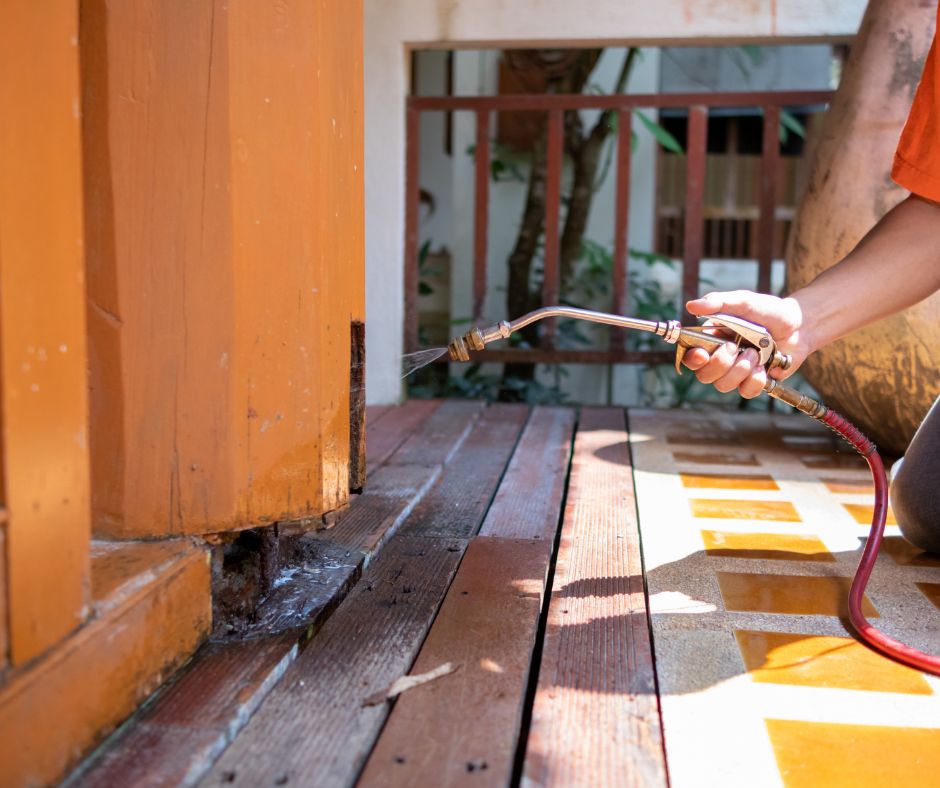Guaranteed Pest Control in Charlotte County FL
Guaranteed Pest Control in Charlotte County FL
Blog Article
Uncover the Significance of Insect Control in Preserving a Healthy And Balanced Atmosphere and Treatment Methods
Pest control plays an essential role in safeguarding not just human health and wellness but also the delicate balance of our ecosystems. As we explore the ramifications of pest control methods, it comes to be essential to think about both the prompt benefits and the long-lasting sustainability of our setting.
The Role of Insects in Ecological Communities
Insects, usually watched solely as annoyances, play a complex duty in ecosystems that is important for preserving environmental equilibrium. They add significantly to different environmental procedures, consisting of pollination, nutrient cycling, and bug control. Many insect types, such as and butterflies, are important pollinators for a broad variety of plants, which in turn sustains biodiversity and food production.
Furthermore, insects act as prey for various predators, producing an essential web link in food internet. This connection ensures the survival of various species and helps manage populations within ecosystems. Additionally, decomposer pests, such as specific beetles and fungis, are crucial in damaging down raw material, thus enriching dirt and promoting vitamins and mineral recycling.
Alternatively, while bugs can be useful, their overpopulation or invasion right into non-native atmospheres may interfere with these eco-friendly functions. This complexity emphasizes the value of understanding pest dynamics, as reliable parasite administration strategies must think about both their ecological duties and potential influence on human activities. Stabilizing pest presence while decreasing damage is essential for protecting the integrity of ecosystems and making certain agricultural performance.
Health And Wellness Risks Connected With Bugs

The presence of bugs in various settings expands past their eco-friendly functions, as they likewise posture considerable wellness threats to human beings and pets. Several parasites, consisting of rats, pests, and bloodsuckers, are service providers of diseases that can have serious health implications. As an example, rodents are understood to transfer hantavirus and leptospirosis, both of which can cause serious respiratory system and kidney concerns, specifically.
Bugs such as mosquitoes and ticks are infamous for spreading vector-borne illness like jungle fever, dengue high temperature, and Lyme disease. These ailments can result in high morbidity and mortality rates, particularly in susceptible populaces. Furthermore, bugs like roaches and insects can exacerbate allergies and asthma, adding to breathing issues in people, particularly those with pre-existing conditions.
Furthermore, the visibility of bugs can cause mental tension and discomfort, influencing total wellness. Contamination of food and surfaces by parasite droppings and stays can lead to foodborne illnesses, highlighting the significance of keeping sanitary problems - Pest Control in Port Charlotte, FL. Consequently, comprehending click here now the health threats connected with parasites is vital in acknowledging the need of efficient pest administration strategies to guard human and animal health and wellness.
Advantages of Effective Bug Control
Effective insect control is necessary for keeping a healthy and balanced and safe setting, as it continually minimizes the countless risks associated with insect infestations. One of the primary benefits of effective parasite monitoring is the decrease of wellness threats.

Another substantial advantage is the enhancement of overall lifestyle. A pest-free environment contributes to psychological well-being and minimizes stress linked with infestations. In addition, effective bug control fosters a much safer setting for children and family pets, ensuring that homes continue to be sanctuaries click here for more info without damaging chemicals and disease-causing organisms.
Common Pest Control Methods
In the world of bug monitoring, numerous techniques are employed to combat infestations efficiently. These methods can be extensively categorized into three primary techniques: social, mechanical, and chemical controls.
Social control entails changing practices to reduce pest facility, recreation, and survival. This might consist of plant turning, appropriate cleanliness, and habitat manipulation, which collectively create an environment much less conducive to pest proliferation.
Mechanical control employs physical techniques to eliminate insects. Methods such as catches, obstacles, and vacuum cleaners are commonly used to directly remove pests from an area. This technique is especially reliable for managing rodents and bugs without using damaging chemicals.
Chemical control involves the application of chemicals to take care of bugs. These substances can be classified right into insecticides, herbicides, and fungicides, each targeting specific sorts of bugs. It is important to utilize these chemicals sensibly, adhering to safety and security guidelines and policies to reduce possible damage to non-target types and the environment.
Each pest control strategy has its benefits and limitations, and often, an integrated approach combining several methods yields the ideal lead to preserving a pest-free environment.
Lasting Parasite Monitoring Practices

Integrated Parasite Management (IPM) is a foundation of lasting techniques, incorporating organic, cultural, mechanical, and chemical strategies to handle insects. Organic control entails presenting all-natural killers or bloodsuckers to subdue parasite populations. Cultural practices, such as crop rotation and polyculture, disrupt pest life cycles and improve community durability.
Mechanical methods, such as traps or obstacles, can effectively prevent pest accessibility without chemical treatment (Pest Control in Port Charlotte, FL). In addition, maintaining healthy ecosystems through correct dirt administration, plant health and wellness, and biodiversity can naturally mitigate pest concerns
Education and learning and understanding are essential parts, equipping individuals and neighborhoods to recognize pest threats early and implement precautionary steps. By fostering a holistic strategy that stabilizes bug control with ecological integrity, lasting insect management techniques not only protect check here plants and frameworks but also add to a much healthier atmosphere for future generations.
Final Thought
By recognizing the duty of pests, acknowledging affiliated wellness risks, and utilizing varied therapy techniques, a sustainable technique to pest monitoring can be achieved. Integrated Pest Administration (IPM) highlights an all natural methodology that reduces harm to valuable organisms while successfully regulating parasite populations.
Report this page